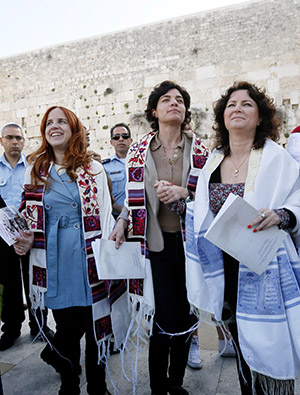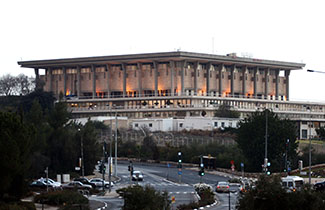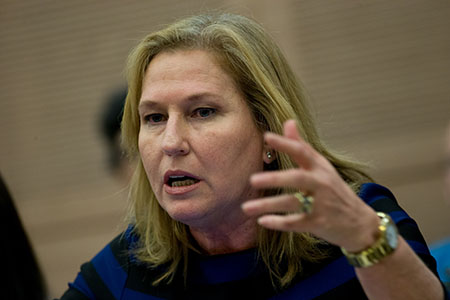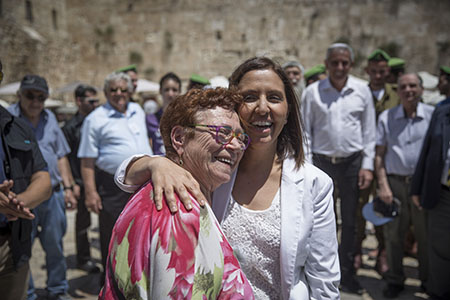Israeli Scene
News + Politics
Israel’s Political Gender Revolution

For decades, one woman—strong, stalwart, plainspoken yet grandmotherly Golda Meir—cast a giant shadow over the image of female political leadership in the State of Israel.
The fourth prime minister led the Jewish state at an early point in the country’s history, from 1969 to 1974, a time when elected female leaders in Western democracies were nearly nonexistent. But her ascent left a somewhat misleading impression. Meir’s international celebrity, paired with the drafting of women into the Israeli military and the egalitarian ethos of the early kibbutzim, projected to the world a false notion of gender parity.
In truth, as the number of women in the parliaments and governments of Western democracies steadily increased over the past half century, Israel was trailing behind even many third-world countries. As recently as March 2012, there were 78 countries in the world with a higher percentage of women in their legislatures than Israel.
That picture is now changing, with a gender revolution taking place on Israel’s political stage. Of the 120 Knesset members chosen in the country’s last elections in March 2015, 29 were women. Subsequent turnover has brought the total to 33, a five-fold increase in the past 25 years. For the first time, more than a quarter of the Israeli parliament is female, with women represented at an even higher rate in Israel than in the United States Congress, where they comprise only 19 percent of lawmakers.
The transformation of women in political power in Israel reaches beyond numbers. For most of Israel’s history, the few female Knesset members fit a stereotype. Like Meir, they tended to be older, left-wing party insiders who had spent years climbing the ranks and were considered “one of the boys.” They downplayed their gender and were loathe to openly advocate for women’s empowerment. Today, there is no such thing as a typical Israeli woman leader. Female Knesset members span a range of ages and life experiences—from a young, single, secular 20-something to an Orthodox mother of seven to a Muslim feminist activist—all with political outlooks ranging from the far left to the far right. Moreover, many of them are outspoken advocates and energetic legislators on what are often regarded as “women’s issues,” such as wage equality, gender parity, sexual harassment and domestic abuse. There is an impressive amount of cross-party cooperation by the women on these issues, though there also can be disagreement and conflict among them, particularly when it comes to matters of security and diplomacy.
While they have seen success, both in numbers and in effectiveness—the publication Calcalist determined that 34 percent of all legislation successfully passed in the 19th Knesset (2013-2015) was initiated by women—there is still a long way to go, particularly in the upper echelons of power. In the current ruling coalition, only four of 21 Cabinet ministers are women: Likud’s Miri Regev and Gila Gamliel, Jewish Home’s Ayelet Shaked and the newest member, Yisrael Beytenu’s Sofa Landver. The conservative ultra-Orthodox parties, which wield considerable political muscle, bar any political representation by women and protect the status quo in personal-status matters such as marriage and divorce.
“You definitely need a critical mass of women in powerful positions to make real progress, and we are getting there,” said Professor Ruth Halperin-Kaddari, head of the Rackman Center for the Advancement of the Status of Women at Bar-Ilan University in Ramat Gan. “But having women in powerful positions does not automatically guarantee advancement in women’s rights and women’s status.”

Nor does everyone think it should. Dalia Itzik, the former speaker of the Knesset who has held numerous high-level government posts, says it’s important that women not be relegated solely to issues of welfare and education.“Women have to focus not just on ‘women’s issues,’” she said, because it sends the message that women belong in the kitchen, rather than dealing with issues like security concerns. In addition, “gender equality is not just a women’s issue,” and should be addressed by men as well, Itzik said in a brief interview after addressing a session at Hadassah’s national convention in Atlanta in July.
To understand the longtime status quo of women as well as the evolution of change, one has to understand Israel’s parliamentary system. Legislators are chosen within a party that runs a list of candidates in national elections. The traditionally dominant parties—Labor and Likud—hold American-style primary elections to pick their lists. In recent years, grassroots pressure from women’s rights groups has forced some parties to reserve slots specifically for women, guaranteeing a minimum number of female representatives. Smaller parties, like Yesh Atid, Kulanu and Yisrael Beytenu, with lists handpicked by powerful party leaders, now have significant female representation—a sign that the men at the top believe that women will be a strong draw for voters.
The change was the culmination of a process that began in the 1970s and evolved throughout the 1990s with the creation of the first feminist organizations and outspoken pioneering female figures in the Knesset, including Shulamit Aloni, Marsha Freedman, Anat Maor and Yael Dayan, who fought for measures that would help their numbers grow. At first, political feminism in Israel was treated like a radical idea imported from overseas by women like Freedman, who immigrated to Israel from the United States. A major step forward occurred in 1984 with the creation of the Israel Women’s Network, the first mainstream women’s political advocacy organization to lobby for legislation relevant to the lives of women and the cause of equality.
The growth of the Israel Women’s Network and other feminist groups led party leaders to recognize that voters were paying closer attention to gender, explained Hamutal Gouri, executive director of the Dafna Fund, a feminist foundation. “A message was sent to political parties that they would be rewarded at the polls if they had women on their lists, and that women care about women’s issues.”

That message was boosted by the appearance of a gender gap in recent Israeli voting patterns. For many years, “women voted the same as men in their communities did,” Gouri said. That changed in 2009, when Tzipi Livni topped the ticket of the Kadima Party and came close to defeating Benjamin Netanyahu of Likud. Women, for the first time, showed their electoral strength by voting disproportionately for Livni, who won the popular vote but was unable to gather a wide enough coalition to rule. Since then, male and female voting habits have continued to diverge, and “that has sent a message,” she said, that “gender is a factor in politics.”
The sole party currently headed by a woman and claiming a majority of female representatives—three of five—is Meretz, led by Zehava Gal-On. Cofounded by the late legendary feminist Shulamit Aloni, the left-wing party has long been in the forefront of fighting for women’s rights as well as rights for Palestinians, African asylum-seekers and the LGBT community. Gal-On and her younger colleagues, Michal Rozin and Tamar Zandberg, carry on the combative legacy of Aloni, who died in 2014.
On the center-left, emerging stars include Merav Michaeli of the Zionist Union, a charismatic and high-profile radio and television personality who came to political life as a result of her activism on behalf of rape victims and other feminist causes. Michaeli proposed legislation in 2014 that would require gender parity—an equal number of men and women—for every party that wanted to run for Knesset. Every female Knesset member signed on to the bill, although only 15 men did.
But as proactive and visible as their female representatives may be, Meretz and the Zionist Union—the latter an alliance including the Labor, Hatnuah and Green parties—are currently in the opposition. Under Prime Minister Netanyahu’s powerful Likud-led coalition, the real power to facilitate change has been on the right side of the political map.
One of four women in Netanyahu’s Cabinet, Gila Gamliel serves as Israel’s first minister for social equality. Some of her efforts have been widely praised by feminist groups: She pushed through legislation outlawing marriage before the age of 18 and promoted measures that advance women in the job market. Occasionally, however, she has found herself at odds with socially liberal feminists, most recently in a pitched battle over proposed child custody legislation. Gamliel backed a law that would change the court’s policy in divorce cases of granting automatic custody of young children to their mothers. Numerous women’s advocacy organizations and female Knesset members vigorously fought against the measure and eventually defeated it.

The battles that involve the country’s religious establishment are the toughest for Israeli women to overcome, and their record of success is poor. The ultra-Orthodox parties United Torah Judaism and Shas—key members of Netanyahu’s coalition—work closely with the Israeli rabbinate, which controls all issues related to the personal status of Jewish women
in Israel. “You can move nothing in matters of family law, marriage, divorce, courts,” said Halperin-Kaddari of the Rackman Center. “Women are completely powerless in this area.”
In the meantime, women’s advocacy groups are focusing much of their efforts on the local level to bring more women into Israeli politics, with the hope that more will rise eventually to national positions.
Gouri’s Dafna Fund, founded in 2003, is one such group that bolsters women in the political realm. The fund helps women “overcome structural barriers,” said Gouri, including access to money, media and networks, as they launch their campaigns.
While the current number of women in the Knesset is a vast improvement over years past, their representation, warns Halperin-Kaddari, remains “uncertain, volatile and prone to unexpected twists because, like the U.S., we don’t have any quotas or guarantees for female representation enshrined in law,” as many European countries do.
In the age of Germany’s Angela Merkel, Great Britain’s Theresa May and the possibility of a President Hillary Clinton, the prospect of a woman at the very top in Israel in the near future still seems remote. But the breakthroughs of the past few years inspire hope that somewhere in the growing crop of female lawmakers is a woman who will pick up the torch to become the next Golda Meir.
Allison Kaplan Sommer lives in Israel and writes on culture and politics, primarily for Haaretz.










 Facebook
Facebook Instagram
Instagram Twitter
Twitter
Leave a Reply